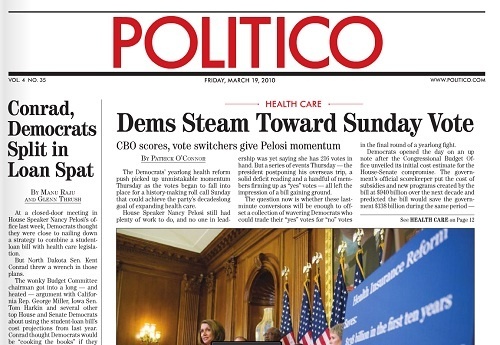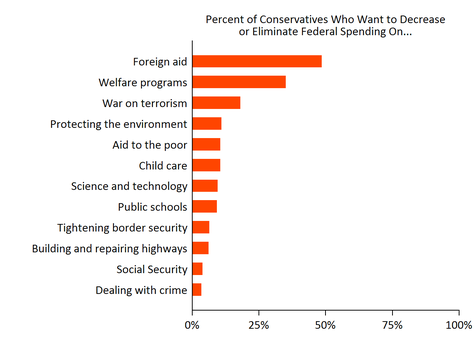An interesting development reported in the
Wall Street Journal and
Talking Points Memo:
A group of Catholic nuns has written a letter, sent to every member of Congress, urging them to pass health care reform. The support is a rare break from the U.S. Conference of Catholic Bishops, which has publicly opposed the bill over its abortion language.
The nuns, who are the heads of organizations representing a total of 59,000 Catholic sisters, wrote, in part, that the Senate bill will "make historic new investments -- $250 million -- in support of pregnant women. This is the REAL pro-life stance, and we as Catholics are all for it."
That last quotation comes at the end of the following paragraph in their statement:
The health care bill that has been passed by the Senate and that will be voted on by the House will expand coverage to over 30 million uninsured Americans. While it is an imperfect measure, it is a crucial next step in realizing health care for all. It will invest in preventative care. It will bar insurers from denying coverage based on pre-existing conditions. It will make crucial investments in community health centers that largely serve poor women and children. And despite false claims to the contrary, the Senate bill will not provide taxpayer funding for elective abortions. It will uphold longstanding conscience protections and it will make historic new investments – $250 million – in support of pregnant women. This is the REAL pro-life stance, and we as Catholics are all for it.
I have no way of knowing how broadly representative the viewpoint expressed by this statement is among members of Catholic women's religious orders, not to mention Catholics more generally. But the statement unquestionably does accord with at least some important elements of official, mainstream Catholic social doctrine. (Even the US Conference of Catholic Bishops, which opposes the Senate version of the health care bill on anti-abortion grounds, has
repeatedly affirmed the principle that "for the Catholic Church, health care is a basic human right.") The fact that this might surprise some people is probably sufficient reason to read Sisters' letter in full (below); but I think the letter also makes a good case in substantive terms.
=> It is probably significant that the release of this letter comes a few days after the head of the Catholic Health Association, the national association of Catholic hospitals and other medical service organizations,
announced support for the Senate version of the Democratic health care reform bill--an event emphasized in the letter's first paragraph. Of course, it is also sociologically significant (and might also surprise some people) that the President of the CHA is a nun, Sister Carol Keehan. Keehan's statement endorsing the bill, "
The time is now for health reform", called the bill
an historic opportunity to make great improvements in the lives of so many Americans. Is it perfect? No. Does it cover everyone? No. But is it a major first step? Yes.
The insurance reforms will make the lives of millions more secure, and their coverage more affordable. The reforms will eventually make affordable health insurance available to 31 million of the 47 million Americans currently without coverage.
Of course,
CHA has a major concern on life issues. We said there could not be any federal funding for abortions and there had to be strong funding for maternity care, especially for vulnerable women.
But with respect to abortion, the compromise solution written into the Senate bill strikes her as acceptable:
The bill now being considered allows people buying insurance through an exchange to use federal dollars in the form of tax credits and their own dollars to buy a policy that covers their health care. If they choose a policy with abortion coverage, then they must write a separate personal check for the cost of that coverage. [....]
My non-expert impression is that the CHA's endorsement of the Senate bill is probably a Big Deal, if only because it could provide political cover for wavering members of Congress who are Catholic and/or have Catholic constituents if they vote for the current health care reform package. (As things now stand, moving even a few Congressional votes, or keeping even a few vulnerable Congresspeople from being defeated on this issue in November, would matter a lot.) And although the Sisters' letter is probably less politically potent in itself than the CHA endorsement, it's a significant attention-getting follow-up.
=> Although I'm not sure the Sisters would put it in quite these terms, the message is clear:
Pass the damn bill.
--Jeff Weintraub
UPDATE: For another significant follow-up, see the May 18 editorial in the
National Catholic Reporter: "
Congress, and its Catholics, should say yes to health care reform."
==============================
Catholic Sisters Support Passage of Healthcare BillMarch 17, 2010
This is the text of the letter being sent to all Members of Congress:Dear Members of Congress:
We write to urge you to cast a life-affirming “yes” vote when the Senate health care bill (H.R. 3590) comes to the floor of the House for a vote as early as this week. We join the Catholic Health Association of the United States (CHA), which represents 1,200 Catholic sponsors, systems, facilities and related organizations, in saying:
the time is now for health reform AND the Senate bill is a good way forward.
As the heads of major Catholic women’s religious order in the United States, we represent 59,000 Catholic Sisters in the United States who respond to needs of people in many ways. Among our other ministries we are responsible for running many of our nation’s hospital systems as well as free clinics throughout the country.
We have witnessed firsthand the impact of our national health care crisis, particularly its impact on women, children and people who are poor. We see the toll on families who have delayed seeking care due to a lack of health insurance coverage or lack of funds with which to pay high deductibles and co-pays. We have counseled and prayed with men, women and children who have been denied health care coverage by insurance companies. We have witnessed early and avoidable deaths because of delayed medical treatment.
The health care bill that has been passed by the Senate and that will be voted on by the House will expand coverage to over 30 million uninsured Americans. While it is an imperfect measure, it is a crucial next step in realizing health care for all. It will invest in preventative care. It will bar insurers from denying coverage based on pre-existing conditions. It will make crucial investments in community health centers that largely serve poor women and children. And despite false claims to the contrary, the Senate bill will not provide taxpayer funding for elective abortions. It will uphold longstanding conscience protections and it will make historic new investments – $250 million – in support of pregnant women. This is the REAL pro-life stance, and we as Catholics are all for it.
Congress must act. We are asking every member of our community to contact their congressional representatives this week. In this Lenten time, we have launched nationwide prayer vigils for health care reform. We are praying for those who currently lack health care. We are praying for the nearly 45,000 who will lose their lives this year if Congress fails to act. We are also praying for you and your fellow Members of Congress as you complete your work in the coming days. For us, this health care reform is a faith mandate for life and dignity of all of our people.
We urge you to vote “yes” for life by
voting yes for health care reform in H.R. 3590.
Sincerely,
Marlene Weisenbeck, FSPA
LCWR President
Leadership Conference of Women Religious
Joan Chittister, OSB
Co-Chair Global Peace Initiative of Women
Erie, PA
Sr. Mary Persico, IHM
President
Congregation of the Sisters, Servants of the Immaculate Heart of Mary,
Scranton, PA
Sr. Susan Hadzima, IHM
Councilor for Missioning and Community Life
Sisters, Servants of the Immaculate Heart of Mary,
Scranton, PA
Mary Genino (RSHM)
Religious of the Sacred Heart of Mary
Western American Province.
Nancy Conway CSJ
Congregation Leadership Team
The Congregation of St. Joseph
Debra M. Sciano, SSND
Provincial Leader
Milwaukee Province, School Sisters of Notre Dame
Josephine Gaugier, OP
Adrian Dominican Sisters
Holy Rosary Mission Chapter Prioress
Adrian, MI
Kathleen Nolan, OP
Adrian Dominican Sisters
Office of the General Council
Marlene Weisenbeck, FSPA
President
Franciscan Sisters of Perpetual Adoration
La Crosse, WI
Corinne Weiss
Servants of Jesus Leadership Team
Saginaw MI
Adrian Dover OP
Prioress
Dominican Sisters of Houston, Texas
Rose Mary Dowling, FSM
President
Franciscan Sisters of Mary
Leadership Team
Sisters of Charity of the Blessed Virgin Mary
(from Mary Martens, BVM, Administrative Assistant)
Beatrice Haines, OLVM
President, Our Lady of Victory Missionary Sisters
Huntington IN
Joan Saalfeld, SNJM, Provincial
Sisters of the Holy Names of Jesus and Mary
U.S.-Ontario Province
Jo'Ann De Quattro, SNJM
Sisters of the Holy Names
U.S.-Ontario Province Leadership Team
Sharon Simon, OP
President
Racine Dominicans
Maryann A. McMahon, O.P.
Vice President
Dominican Sisters of Racine, WI
Agnes Johnson, OP
Vice President
Racine Dominicans
Pat Mulcahey, OP
Prioress of Sinsinawa Dominicans
Pam Chiesa, PBVM
President
Sisters of the Presentation, San Francisco
Patricia Anne Cloherty, PBVM
Leadership Team, Sisters of the Presentation, San Francisco
Gloria Inés Loya
Leadership Team
Sisters of the Presentation, San Francisco
Gloria Marie Jones, OP
Dominican Sisters of Mission San Jose
Congregational Prioress and Council
Mary Litell
Provincial Councilor
Sisters of St. Francis of Penance and Christian Charity St. Francis Province
Theresa Sandok, OSM
Servants of Mary (Servite Sisters)
Ladysmith, Wisconsin
Sr Claire Graham SSS
General Director
Sisters of Social Service
Encino CA
Margaret Byrne CSJP - Congregation Leader
Teresa Donohue CSJP - Assistant Congregation Leader
Sisters of St. Joseph of Peace
Sr. Carmelita Latiolais, S.E.C.
Sisters of the Eucharistic Covenant
Joan Mumaw, IHM – Vice President
On behalf of the Leadership Council
Sisters, Servants of the Immaculate Heart of Mary
Monroe, Michigan
Sister Clare of Assisi Pierre, SSF
Sisters of the Holy Family
New Orleans, LA
Sister Marla Monahan, SND
Provincial
Sisters of Notre Dame
(St. Claire Regional Medical Center in Morehead, KY
and St. Charles Care Center in Covington, KY)
Vivien Linkhauer, SC
Sisters of Charity of Seton Hill, United States Province
Greensburg, PA
Dolores Maguire
Sisters of the Holy Faith
Northern California LCWR Region XIV
Sr. Mary Elizabeth Schweiger, OSB
Subprioress
Mount St. Scholastica
Atchison, KS
Marianites of Holy Cross
Sr. Suellen Tennyson, MSC
Congregational Leader
Barbara Hagedorn, SC
Sisters of Charity of Cincinnati
Mt. St. Joseph, Ohio
Francine Schwarzenberger OP
Dominican Sisters of Peace
Denver, Colorado
Sister Maureen McCarthy
School Sisters of St. Francis
U.S. Provincial Team
Milwaukee, WI
Eileen C. Reid, RJM
Provincial Superior
Religious of Jesus and Mary
Washington DC
Sister Cecilia Dwyer, O.S.B.
Prioress
Benedictine Sisters of Virginia
The Congregation of Sisters of St. Agnes
Sister Joann Sambs, CSA
General Superior
Sisters of St. Francis
Tiffin, Ohio
from Sr. Mary Kuhlman)
Sr. Helen McDonald, SHCJ
Province Leader
Society of the Holy Child Jesus
Leadership Team
Sisters of the Precious Blood
Dayton, OH<
The Leadership Team of the Sisters of St. Joseph of the Third Order of St. Francis
Sister Jane Blabolil, SSJ-TOSF
Sister Michelle Wronkowski, SSJ-TOSF
Sister Dorothy Pagosa, SSJ-TOSF
Sister Linda Szocik, SSJ-TOSF
Sr. Gladys Guenther SHF
Sisters of the Holy Family
Congregational President
Fremont, CA
Sr. Dorothy Maxwell, Councilor
Sisters of St. Dominic
Blauvelt New York
Sheral Marshall, OSF
Provincial Councilor
Sisters of St Francis
Marilyn Kerber, SNDdeN
Canonical Representative, Ohio Province
Sisters of St. Louis, California Region
(from Sr. Michele Harnett, SSL)
Ruth Goodwin, OSF
Sisters of ST. Francis of Philadelphia
Sisters of Mercy of the Americas Leadership Team
Sr. Joanne Buckman, OSU
Ursuline Sisters of Cleveland




